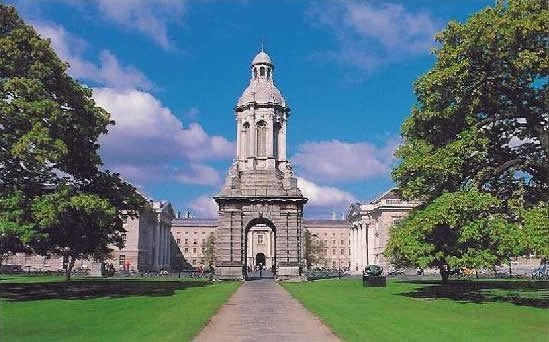Trinity College Dublin

Age: 419
History: Trinity College Dublin is the oldest university in Ireland and one of the older universities of Western Europe. The College was founded in 1592 when a small group of Dublin citizens obtained a charter from Queen Elizabeth incorporating Trinity College juxta Dublin. During the next 50 years the community increased. Endowments, including considerable landed estates, were secured, new fellowships were founded, the books which formed the beginning of the great library were acquired, a curriculum was devised and statutes were framed. In recent years, the university has grown massively - there were only 1,500 students in 1939, compared with more than 16,000 today.
Address: Situated in the heart of Dublin, Trinity's campus occupies an unrivalled position close to everything the city has to offer.
Ambience: Trinity retains a strong "campus" atmosphere despite its location in the centre of a capital city (and despite its being one of the most significant tourist attractions in Dublin). This is in large part due to the compact design of the campus, whose main buildings look inwards, and the existence of only a few public entrances.
Vital statistics: Just over 16,000 students, of whom nearly half are postgraduates.
Added value: The Biosciences Development is due for completion in mid 2011 and is the most ambitious construction project in Trinity College’s history. This Development will define the scientific research landscape in Trinity College and will allow Ireland to take an international lead on the delivery of quality pharmaceutical and biotechnology research infrastructure. The Trinity College library, meanwhile, is the largest research library in Ireland.
Easy to get into? Postgraduate work in Trinity College Dublin is very academically challenging and as a result the University has high academic entry requirements. Applicants will need to hold at least a 2.1 honours degree from an Irish university or equivalent result from a university in another country.
Are there scholarship opportunities? TCD offers hundreds of studentships in all PhD areas, including: Engineering, Digital Arts and Humanities, Molecular and Cell Biology, Electricity Research, Telecommunications, Molecular Medicine, Earth and Natural Sciences, and Physics.
Glittering alumni: Jonathan Swift, author of Gulliver's Travels; Samuel Beckett, playwright and Nobel prizewinner; philosophers George Berkeley and Edmund Burke; Mary McAleese, current president of Ireland; author and poet Oscar Wilde; Mary Robinson, former UN commissioner for human rights.
Transport links: All bus and train routes pass close to the front arch of the college.
Who's the boss? On Saturday, 2 April 2011, Professor Patrick Prendergast was elected Provost of Trinity College Dublin. He will be the 44th Provost of the College and takes over from the current Provost Dr John Hegarty on 1 August.
Overall ranking: Ranked 52nd in the 2010 QS World Universities Ranking.
Nightlife: Dublin has a full and varied cultural and night life. A particular feature of the city is the tradition of live music in every conceivable venue, from street busking to the National Concert Hall – not forgetting the singing pubs, where traditional music still flourishes. With one of the youngest populations of Europe’s major cities, Dublin offers an unusually congenial atmosphere for students. The bohemian area of Temple Bar is located close to the College, where second hand bookshops, street markets, ethnic eateries etc can be found.
Cost: Fees for full-time EU postgraduate students are €5,250 per year for a PhD, and €5,750 for a Masters.
Any accommodation? Incoming students are mainly accommodated in College residences at Trinity Hall. Non-EU students can apply as soon as they have confirmed acceptance of an offer of a place in Trinity College and have received their TCD ID number. An Accommodation Advisory Service is run before the start of the autumn term, which is known as Michaelmas Term, to assist students seeking private accommodation in Dublin. Overseas TCD students coming to Dublin for the first time can avail of temporary accommodation on the College campus while they search for long term accommodation.
Cheap to live there? Recent figures for the cost of a year's living in Dublin have ranged between €8,000 and €12,100, largely depending on the type of accommodation chosen. These estimates include rent, electricity, food, books and laundry and medicine as well as travel passes and social expenses, but exclude tuition fees.
Prospectus: http://www.tcd.ie/Graduate_Studies/index.php
Join our commenting forum
Join thought-provoking conversations, follow other Independent readers and see their replies
Comments
Bookmark popover
Removed from bookmarks